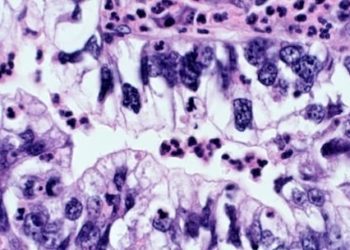Thoracoscopic Talc Poudrage vs Talc Slurry via Chest Tube have similar outcomes
1. In patients with malignant pleural effusions, this randomized control trial of thoracoscopic talc poudrage versus talc slurry administered via chest tube found no significant differences in outcomes at 180 days.
2. Differences may be present between the treatment groups that were not detected by the study.
Evidence Rating Level: 2 (Good)
Study Rundown: The number of cancer cases reported globally are on the rise. A common complication of cancer are malignant pleural effusions, which, if not treated promptly, can lead to worsening dyspnea and reduced quality of life. Talc delivery to the pleural space has been shown to induce pleurodesis. This study compared thoracoscopic talc poudrage with talc slurry delivered via chest tube to compare the induction of pleurodesis. In the primary outcome of pleurodesis failure, no significant difference between the two treatment procedures were found.
This study is limited by its lack of generalizability to all patients with a malignant pleural effusion. Thoracoscopy under moderate sedation, could only be provided to those who are able to tolerate and undergo the procedure. Moreover, the physicians were not blinded to the randomization procedure at time of the follow-up, which may have led to a form of bias regarding follow-up interventions.
Click to read the study in JAMA
Relevant Reading: Randomized trial of pleural fluid drainage frequency in patients with malignant pleural effusions: the ASAP trial.
In-Depth [randomized controlled trial]: In this study, a total of 330 participants were enrolled from 17 hospitals in the United Kingdom and randomized into one of the two treatment groups. The enrollment period lasted from August 2012 to April 2018 and the follow up phase ended in October 2018. In order to be eligible, patients had to be above 18 years of age, with an estimated survival of over 3 months and a diagnosis of malignant pleural effusion, diagnosis of cancer with an unexplained effusion or visible pleural changes on radiology consistent with malignancy. Patients also had to be able to tolerate thoracoscopy under moderate sedation. Patients were excluded if pregnant, lactating, known contraindication to pleurodesis or any study intervention. There was not significant difference between the groups in pleurodesis failure rate (22% vs 24% p-0.74). Overall, no statistically significant differences in the prespecified secondary outcomes at 180 days including mortality, dyspnea, and health-related quality of life.
Image: PD
©2020 2 Minute Medicine, Inc. All rights reserved. No works may be reproduced without expressed written consent from 2 Minute Medicine, Inc. Inquire about licensing here. No article should be construed as medical advice and is not intended as such by the authors or by 2 Minute Medicine, Inc.




